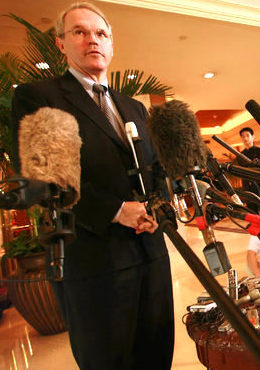 |
|
U.S. Assistant Secretary of State Christopher Hill speaks at the news conference in Beijing on July 12. Beijing (AFP Yonhan News)
|
In dealing with North, S.K.’s complacency, Japan’s preemptive strike idea chided
Japanese media have expressed disapproval about the South Korean government’s strong criticism of Tokyo’s push for a U.N. Security Council resolution against North Korea. Japanese daily Nihon Keizai Shimbun said in an editorial on July 12, "Each nation of the world has taken its position, respectively, regarding North Korea’s missile tests, but we cannot understand that of South Korea. The South Korean presidential office seems to want to say that Japan is overreacting. South Korea, however, seems to play down the threat [of North Korean missiles]." Japan’s conservative mainstream daily Sankei said in an editorial, "It is strange to criticize Japan which, as a neighboring country, is struggling to prepare countermeasures, and to not blame North Korea, which is threatening the international community by launching missiles."However, the Japanese media did raise concerns about Japanese cabinet ministers’ language suggesting the possibility of a preemptive strike against North Korea. The Asahi Shimbun said in an editorial that "preemptive strikes apparently sound good, but we need to reconsider calmly. Japan’s peace constitution, in which there is a principle that Japan will not attack other nations again and never pose a military threat to foreign countries, is supported by its people," the editorial continued. Under its constitution, Japan can exercise its defense power only when the nation is attacked by other countries. This is Japan’s basic level of defense under the peace constitution and the U.S.-Japan security treaty. Mainich Shimbun, a leading Japanese daily, noted in an editorial, "If Japan acquires offensive weapons based on the preemptive strike option, the policy that Japan exercises a minimum defensive power only when attacked by other nations will have to be dramatically changed. In this case, Japan should give up its position as a country with a ’peace constitution.’ " Asian nations would then sound the alarm of a ’Japanese threat,’ the editorial continued. The Tokyo Shimbun and Asahi Shimbun emphasized that there are a number of problems in some politicians’ suggestion of pre-emptive strikes in terms of military capability and technology. If Japan tries to strike North Korea, it needs aircraft equipped with the capability to disturb radar in order to avert anti-aircraft fire, something it currently does not possess. Though Japan owns fighter jets, it could not effectively strike North Korea, as Japan’s main fighter, the F-15J, is weak in executing ground attacks. Moreover, Japan does not possess long-range ground-to-ground cruise missiles with a firing range of 1,250-2,500 km, such as Tomahawks, which are needed to execute preemptive strikes. Accordingly, some experts say that Japanese cabinet ministers, including Defense Agency’s Chief Fukushiro Nukaga, mentioned preemptive strikes against North Korea because they want to justify the purchase of strategic offensive arms such as long-range ground-to-ground missiles.






